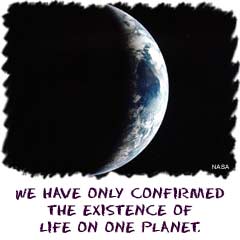|
|
||||||||||||||||
 |
|

|
||||||||||||||
What Makes a Planet? You can learn more about planets in the Solar System section but let's give a quick overview that a planet is made up of heavy elements. Stars are mainly made of hydrogen (H) and helium (He). Planets generally have all of the other elements in their crust and core. You will find large amounts of iron (Fe) and minerals. Also, planets do not have the nuclear reactions igniting their atmosphere.
You can learn more about planets in the Solar System section but let's give a quick overview that a planet is made up of heavy elements. Stars are mainly made of hydrogen (H) and helium (He). Planets generally have all of the other elements in their crust and core. You will find large amounts of iron (Fe) and minerals. Also, planets do not have the nuclear reactions igniting their atmosphere.
Think About The EarthWhen you think about the characteristics that make a planet a planet, think about the Earth. We have an atmosphere that is not on fire. The Earth is basically a large rock. We have a core of molten iron and plates of rock floating on the surface. Also, most of our mass and diameter are because of the planet, not the atmosphere. Mars and Venus are the same way.But what about Jupiter, what makes it a planet? It has huge atmosphere compared to the size of the planet. Remember, that there are no nuclear reactions in the atmosphere of the planet. Therefore, Jupiter is a planet. If you go deep enough, you will find rock that exists in the center of that huge, gaseous atmosphere. Exploring Our PlanetsAs you know, we have completed several missions that study other planets. Even today, engineers across the Earth are developing new spacecraft that will explore our Solar System. Since spacecraft are relatively small, scientists debate the number and types of instruments that will visit each planet. They prioritize mission goals. Some spacecraft focus on studying atmospheres and gases. Other spacecraft are detecting radiation and gravitational fields. If you are interested in space, there are millions of things to discover in our Solar System.Discovering New PlanetsWhile we are studying the planets in our Solar System, some astronomers are using a variety of telescopes to discover planets in other systems. As of summer 2006, 193 planets have been discovered in other systems. Many of those planets are large gas giants similar to Jupiter. The bigger they are, the easier they are to find.One of the newest telescopes is the Large Binocular Telescope being built on Mt. Graham in Arizona. The telescope will have a larger collecting area than any other telescope on Earth. It was designed to discover other planets and capture images at a very high resolution. The LBT project is an international project and the mirrors were built in Italy and shipped to the U.S. It went online (first light) in 2005 and completed mounting its second primary mirror in August 2006. Expect to see some wonderful images from this new telescope. |

|
|||||||||||||||
Useful Reference MaterialsEncyclopedia.com:http://www.encyclopedia.com/topic/planet.aspx Wikipedia: http://en.wikipedia.org/wiki/Planet Encyclopædia Britannica: http://www.britannica.com/EBchecked/topic/463008/planet | ||||||||||||||||
|
RETURN TO TOP or Search for more information... * The custom search only looks at Rader's sites. |
|||||||||||||||
©copyright 1997-2015 Andrew Rader Studios, All rights reserved. Current Page: Cosmos4Kids.com | Systems | Planets |
||||||||||||||||
|
|
||||||||||||||||

